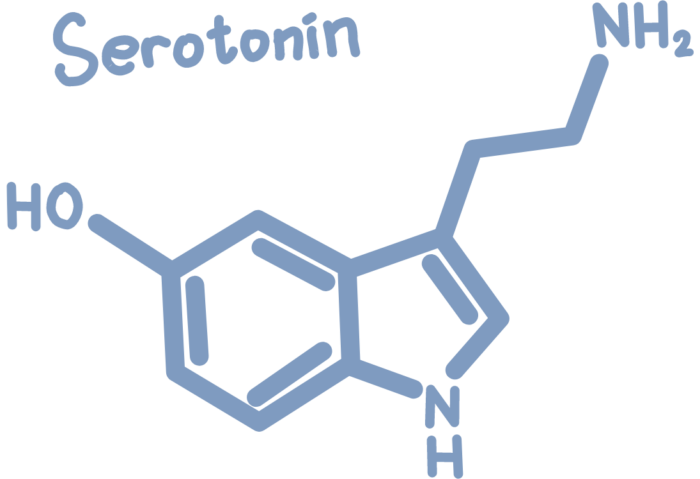How to Increase Serotonin: The Science Behind Mood-Altering Hormones

Picture yourself standing on the edge of a cliff, feeling the cool breeze gently ruffling your hair as you look out at the vast expanse of the ocean below. The sun is hanging low in the sky, casting beautiful streaks of crimson and gold across the horizon, and for a moment, everything feels just perfect. Take a deep breath and enjoy the salty scent of the sea air, letting a sense of calm wash over you like a warm hug. In that brief moment, you’re overcome with a feeling of contentment and peace—a truly serene moment.
But what if I told you that this feeling of bliss wasn’t just a product of your surroundings? What if I told you that it was actually the result of a tiny molecule being produced in your brain called serotonin. This “happiness hormone” plays a significant role in shaping your thoughts, emotions, and experiences, making our cherished memories and emotional well-being possible.
In this blog post, we’ll dive into the fascinating world of serotonin and uncover its powerful influence on our mental and emotional well-being. From its impact on our mood to its role in shaping our everyday experiences, join us as we explore the science and sensation of serotonin and how this incredible neurotransmitter helps define our experiences.
Unlock the Secrets to a Happier, Healthier You: This post is part of our series diving into the science behind the mood-altering hormones and neurotransmitters that shape your daily experiences. In this series, we will explore the intricate roles of Serotonin, Dopamine, Endorphins, Oxytocin, Adrenaline, Cortisol, Melatonin, Estrogen, and Progesterone, unraveling their profound impact on your mental and emotional well-being.
Disclaimer:
This blog post contains affiliate links. This means that I may earn a commission if you click on the link and make a purchase, at no additional cost to you. Please note that I only recommend products or services that I genuinely believe in and that align with the content and values of my blog. Your support through these affiliate links helps me maintain and improve the quality of my content. Thank you for your support!
Exploring Serotonin: What is it and How is it Made?
Serotonin, often dubbed the “happiness neurotransmitter,” plays a crucial role in regulating mood, sleep, and appetite. But what exactly is serotonin, and how does our body produce it? Let’s uncover the answers by tracing the journey of tryptophan, the essential amino acid that serves as serotonin’s precursor.
Essential Amino Acid:
Tryptophan is classified as an essential amino acid, which means that our bodies cannot produce it internally. Therefore, we must obtain it from the foods we eat. Foods such as poultry, eggs, dairy products, nuts, and seeds are good sources of tryptophan.
Absorption into the Bloodstream:
When you consume foods containing tryptophan (we’ll explore some of those foods later on in this post), the proteins are digested in the gastrointestinal (GI) track and broken down into their base components, including amino acids like tryptophan. These amino acids are then absorbed into your bloodstream from your small intestines.

Transport to the Brain:
Once in the bloodstream, tryptophan travels throughout your body, including to your brain. The bloodstream serves as the highway that carries nutrients, including tryptophan, to various tissues and organs, including the brain.
Serotonin Synthesis in the Brain:
Tryptophan is a precursor or starting material for the synthesis of serotonin in the brain. This process occurs within specialized cells called neurons, which are the building blocks of the nervous system. Enzymes within these neurons facilitate the conversion of tryptophan into serotonin through a series of biochemical reactions.
Enzymatic Conversions:
Tryptophan undergoes enzymatic conversions, meaning that specific enzymes catalyze or facilitate chemical reactions to transform tryptophan into serotonin. One key enzyme involved in this process is tryptophan hydroxylase combined with BH4 (a molecule that the body already makes) and these convert tryptophan into another compound called 5-hydroxytryptophan (5-HTP). Subsequently, another enzyme called aromatic L-amino acid decarboxylase converts 5-HTP into serotonin with the help of vitamin B6.
Role of Serotonin:
Once synthesized, serotonin functions as a neurotransmitter, which means it acts as a chemical messenger in the brain. Serotonin plays a crucial role in regulating mood, sleep, appetite, and other physiological functions. It helps to modulate various aspects of brain function and behavior, contributing to overall mental and emotional well-being.
Essentially, tryptophan is obtained from the foods we eat and serves as the starting material for creating serotonin in the brain. Through enzymatic conversions, tryptophan is transformed into serotonin, a vital neurotransmitter that helps regulate mood, sleep, and other bodily functions. This process highlights the importance of a balanced diet in supporting optimal brain function and mental health.

Effects of Low Serotonin: Recognizing the Physical and Psychological Symptoms
Low levels of serotonin can cause a variety of physical and psychological symptoms because it plays a key role as a neurotransmitter in regulating mood, sleep, appetite, and cognition. Here’s a look at how low serotonin levels can show up in symptoms:
Depression:
Serotonin is often referred to as the “happiness neurotransmitter” because it plays a crucial role in regulating our mood. If serotonin levels are low, it can lead to persistent feelings of sadness, hopelessness, and loss of interest in previously enjoyable activities, which are often associated with depression.
Anxiety:
Serotonin is also involved in regulating anxiety and stress responses in the brain. Low serotonin levels can lead to heightened levels of stress and worry, resulting in symptoms of anxiety disorders such as generalized anxiety disorder (GAD), panic disorder, or social anxiety disorder.
Sleep Problems:
Serotonin also helps regulate sleep-wake cycles and promotes restful sleep. When serotonin levels are low, people may experience difficulty falling asleep, staying asleep throughout the night, or waking up feeling unrefreshed. Sleep disturbances are common symptoms of low serotonin levels.
Fatigue:
Serotonin boosts energy levels and promotes a sense of liveliness. Low serotonin levels can lead to chronic fatigue and a constant lack of energy, even after getting enough rest. This can make individuals feel physically and mentally exhausted, making it difficult to participate in daily activities.
Irritability:
Serotonin also helps regulate emotional responses and mood stability. When serotonin levels are low, people might feel more irritable, sensitive to stress, and experience mood swings. It can make it harder to deal with daily challenges and lead to stronger reactions to minor frustrations.
Digestive Issues:
Serotonin is not only present in the brain but also in our gut. It plays a role in regulating intestinal motility and function as well as appetite. When serotonin levels are low, it can lead to disruptions in gut function, which may contribute to symptoms like irritable bowel syndrome (IBS), abdominal pain, bloating, and changes in bowel habits.
Memory and Concentration:
Serotonin also plays a role in cognitive function, including memory, attention, and concentration. When serotonin levels are low, it can make it harder to focus, remember things, and do tasks that need mental clarity and concentration.
Remember this: Low serotonin levels can cause a variety of physical and psychological symptoms, such as depression, anxiety, sleep problems, fatigue, irritability, digestive issues, and cognitive impairments. These symptoms can really affect a person’s quality of life and daily functioning, so it’s important to keep serotonin levels in check for good health and well-being.

Natural Ways to Increase Serotonin Levels
1. Increase Serotonin Through Balanced Nutrition:
Consuming a well-rounded diet rich in tryptophan-containing foods is essential for supporting serotonin production.
Foods Rich in Tryptophan:
Tryptophan is an essential amino acid and the precursor to serotonin. Including tryptophan-rich foods in your diet provides the building blocks necessary for serotonin synthesis. Good sources of tryptophan include:
- Poultry: Chicken, turkey
- Red Meat: Beef, lamb, pork
- Fish: Salmon, tuna
- Dairy: Milk, cheese, yogurt
- Eggs
- Nuts and Seeds: Almonds, sesame seeds, pumpkin seeds
- Legumes: Chickpeas, lentils, soybeans
Vitamins and Minerals Supporting Serotonin Synthesis:
Certain vitamins and minerals play essential roles in enzymatic reactions involved in serotonin synthesis. Here are some key vitamins and minerals and their food sources:
- Vitamin B6: Vitamin B6 is a co-factor for enzymes involved in converting tryptophan into serotonin. Good sources include:
- Bananas
- Potatoes
- Chickpeas
- Poultry
- Fish
- Iron: Iron is necessary for the activity of enzymes involved in serotonin synthesis. Good sources include:
- Red meat
- Spinach
- Lentils
- Pumpkin seeds
- Quinoa
- Magnesium: Magnesium is involved in various biochemical processes, including serotonin synthesis. Good sources include:
- Spinach
- Almonds
- Cashews
- Avocado
- Whole grains
- Zinc: Zinc is a co-factor for enzymes involved in serotonin metabolism. Good sources include:
- Oysters
- Beef
- Pumpkin seeds
- Chickpeas
- Cashews
By incorporating a variety of tryptophan-rich foods, along with sources of essential vitamins and minerals, into your diet, you can increase serotonin synthesis and promote optimal mood regulation and emotional well-being.
2. Increase Serotonin Through Regular Exercise:
Regular physical activity isn’t just for maintaining physical health, but it also plays a crucial role in supporting mental and emotional well-being. Exercise has been shown to increase serotonin levels in the brain through different ways:
Increased Tryptophan Availability:
Exercise helps increase the availability of tryptophan, the building block of serotonin, in the bloodstream. Tryptophan competes with other amino acids to enter the brain, and during exercise, the transport of tryptophan across the blood-brain barrier increases. This elevated tryptophan availability in the brain provides more raw material to increase serotonin synthesis.
Enhanced Enzyme Activity:
Regular exercise boosts the activity of enzymes that help make serotonin. When we’re active, our bodies produce more of the enzyme tryptophan hydroxylase, which helps convert tryptophan into serotonin. This increased enzyme activity accelerates the conversion of tryptophan into serotonin, leading to higher serotonin levels in the brain.
Release of Neurotrophic Factors:
Exercise stimulates the release of neurotrophic factors, such as brain-derived neurotrophic factor (BDNF), which helps neurons grow and survive. BDNF also plays a role in regulating serotonin and has been linked to boosting mood and cognitive function. The release of BDNF during exercise may contribute to the mood-boosting effects associated with physical activity.
Reduction of Stress Hormones:
Exercise helps reduce levels of stress hormones, such as cortisol, in the body. Chronic stress can suppress the production and release of serotonin, leading to lower serotonin levels. By reducing stress hormones, exercise creates a positive environment for the production and release of serotonin, which can help improve your mood and reduce anxiety.
Activation of Serotonin Receptors:
Exercise also increases the brain’s sensitivity and responsiveness to serotonin receptors. Serotonin receptors play a crucial role in transmitting serotonin signals, which are key in regulating our mood and emotional well-being.
Remember, regular physical activity can help you increase serotonin levels, improve your mood, reduce stress, and enhance your overall well-being.

3. Increase Serotonin Through Sunlight Exposure:
Exposure to natural sunlight is a great way to increase serotonin levels. Try to spend some time outdoors during the day, even if it’s cloudy. Sunlight exposure helps increase serotonin production in several ways:
Regulation of Circadian Rhythms:
Sunlight exposure helps regulate the body’s internal clock, known as the circadian rhythm. Exposure to natural sunlight, particularly in the morning, helps synchronize the body’s circadian rhythms, promoting optimal sleep-wake cycles. A well-regulated circadian rhythm is essential to increase serotonin synthesis and mood regulation.
Stimulation of Serotonin Production:
Sunlight exposure stimulates the production of serotonin in the brain. Sunlight, particularly natural sunlight that contains full-spectrum light, triggers the release of serotonin precursor molecules in the brain, providing the raw materials necessary for serotonin synthesis.
Vitamin D Synthesis:
Exposure to sunlight can also convert 7-dehydrocholesterol in the skin to vitamin D. Vitamin D plays a crucial role in many bodily functions, including mood regulation and immune function. It supports serotonin synthesis by activating the gene for tryptophan hydroxylase 2 (TPH2), essential for converting tryptophan into serotonin, and enhances serotonin receptor expression, improving the efficiency of serotonin signaling pathways.
Activation of Serotonin Receptors:
Sunlight exposure enhances the activity of serotonin receptors in the brain. Serotonin receptors play a key role in transmitting serotonin’s signals and regulating mood and emotional states. Exposure to sunlight increases the sensitivity and responsiveness of serotonin receptors, making the brain more receptive to serotonin’s mood-enhancing effects.
Improvement of Mood and Well-Being:
Sunlight exposure has been associated with improved mood and emotional well-being. Research has shown that exposure to natural sunlight, particularly during the morning hours, can alleviate symptoms of depression and anxiety. The mood-enhancing effects of sunlight are attributed, in part, to its ability to stimulate serotonin production in the brain.
Overall, sunlight exposure plays a critical role in promoting serotonin synthesis, regulating mood, and maintaining overall mental health.
4. Increase Serotonin Through Stress Management:
Chronic stress can deplete serotonin levels and have a negative impact on mood. However, serotonin levels can improve through stress management techniques. Here’s why:
Reduction of Stress Hormones:
Stress management practices such as mindfulness meditation, deep breathing exercises, and grounding techniques help reduce levels of stress hormones like cortisol in the body. When cortisol levels are high due to chronic stress, they can negatively affect serotonin production and release. By using stress management techniques, you can create a better environment for your body to produce and release serotonin.
Enhanced Neurotransmitter Balance:
Stress management techniques also promote a balance of neurotransmitters in the brain, including serotonin. Chronic stress can disrupt neurotransmitter balance, leading to mood disturbances and emotional imbalances. Stress management practices help restore equilibrium to the neurotransmitter system, ensuring optimal serotonin levels.
Normalization of Brain Activity:
Chronic stress can alter brain activity patterns and impair serotonin function. Stress management techniques have been shown to normalize brain activity and increase serotonin receptor sensitivity. By restoring normal brain function, these practices support serotonin synthesis and enhance mood stability.
Induction of Relaxation Response:
Stress management techniques evoke the relaxation response, a state of deep relaxation characterized by reduced physiological arousal and increased parasympathetic nervous system activity. The relaxation response counteracts the body’s stress response, which is associated with elevated cortisol levels and decreased serotonin activity.
Promotion of Positive Coping Strategies:
Stress management techniques teach individuals effective coping strategies for dealing with stressors. Positive coping strategies, such as problem-solving, cognitive reframing, and social support seeking, help reduce the perceived severity of stress and alleviate its impact on serotonin levels. By empowering individuals to cope more effectively with stress, these techniques increase serotonin synthesis and foster emotional resilience.
Overall, stress management techniques play a critical role in promoting serotonin levels and supporting overall mental health. By lowering stress, balancing neurotransmitters, regulating brain activity, promoting relaxation, and encouraging positive coping methods, these techniques help create the perfect conditions for making serotonin and improving our emotional health.

5. Increase Serotonin Through Quality Sleep:
Adequate sleep is crucial for optimal serotonin production and regulation. Quality sleep plays a vital role in regulating serotonin levels through various mechanisms.
Regulation of Circadian Rhythms:
Sleep is intricately linked to the body’s internal clock, known as the circadian rhythm. Adequate sleep helps regulate the timing of serotonin release, ensuring that serotonin levels fluctuate in sync with the body’s natural sleep-wake cycle. Disruptions to the circadian rhythm, such as blue light at night, irregular sleep patterns or shift work, can disrupt serotonin synthesis and lead to mood disturbances.
Enhanced Tryptophan Availability:
During sleep, the body undergoes various physiological processes that affect serotonin synthesis. Sleep promotes the availability of tryptophan, the precursor to serotonin, in the bloodstream by reducing competition from other amino acids. This increased tryptophan availability provides more raw material for serotonin production in the brain.
Consolidation of Synaptic Connections:
During sleep, the brain processes and consolidates information acquired during wakefulness, strengthening neural pathways associated with serotonin signaling. This synaptic plasticity supports optimal serotonin function and mood regulation.
Restoration of Neurotransmitter Balance:
Sleep allows the brain to restore neurotransmitter balance, including serotonin levels. Adequate sleep promotes the replenishment of neurotransmitter stores and ensures optimal serotonin synthesis and release. On the other hand, sleep deprivation can disrupt neurotransmitter balance, leading to serotonin depletion and mood disturbances.
Regulation of Stress Hormones:
Quality sleep helps regulate stress hormone levels, such as cortisol, which can impact serotonin levels. Chronic sleep deprivation can elevate cortisol levels, leading to serotonin depletion and increased susceptibility to stress-related mood disorders.
Support of Brain Health:
Sleep is essential for overall brain health and function, including serotonin metabolism. Adequate sleep supports neuronal integrity, neurotransmitter synthesis, and cognitive function, all of which contribute to increase serotonin production and mood regulation.
Quality sleep is essential for maintaining serotonin levels and promoting emotional well-being. By prioritizing healthy sleep habits, adequate sleep duration, and quality, individuals can support serotonin synthesis, enhance mood stability, and foster overall mental health.
6. Increase Serotonin Through Social Connection:
Meaningful social interactions and supportive relationships are vital for emotional well-being and serotonin balance. Social connections have a positive impact on serotonin production through a range of psychological and biological processes, such as:
Stress Reduction:
Social connections provide emotional support and buffer against stress. Interactions with friends, family, and community members can soothe feelings of loneliness and isolation, which are associated with increased stress and reduced serotonin levels. By fostering a sense of belonging and support, social connections help regulate stress hormones and create a more conducive environment to increase serotonin synthesis.
Positive Emotions and Well-Being:
Meaningful social interactions and positive emotions associated with those interactions promote positive emotions and well-being. This is closely linked to serotonin function. Engaging in enjoyable social activities, laughter, and sharing experiences with others can elevate mood and increase serotonin release in the brain.
Empathy and Selflessness:
Acts of kindness, empathy, and generosity toward others stimulate serotonin release in the brain. Social connections provide opportunities for empathetic interactions and selfless behavior, which activate neural circuits associated with reward and positive emotions. These experiences trigger serotonin release and reinforce prosocial behaviors, fostering a sense of connection and fulfillment.
Physical Touch and Bonding:
Physical touch, such as hugs, handshakes, and affectionate gestures, triggers the release of oxytocin and serotonin in the brain. These neurotransmitters promote feelings of trust, bonding, and social connection. Close physical contact with loved ones activates neural circuits involved in social reward and reinforces social bonds, leading to increased serotonin levels and enhanced well-being.
Shared Experiences and Support:
Sharing experiences, challenges, and successes with others fosters social cohesion and support. Social connections provide opportunities for mutual support, validation, and understanding, which promote emotional resilience and serotonin production. By offering and receiving support within social networks, individuals feel valued, understood, and connected, leading to increased serotonin levels.
Enhanced Brain Health:
Social interaction stimulates brain regions involved in serotonin synthesis, neural plasticity, and emotional regulation. Regular social engagement promotes neuronal growth, synaptic connections, and neurotransmitter balance, supporting optimal serotonin function and mental health. By maintaining robust social connections, individuals promote brain health and resilience to stress, enhancing serotonin production and emotional well-being.
In summary, social connection positively influences serotonin production through its effects on stress reduction, positive emotions, empathy, physical touch, shared experiences, and brain health.

Practical Tips to Increase Serotonin Production
While understanding the science behind how serotonin is produced is important, incorporating simple strategies into your daily routine can make a significant difference in boosting your serotonin levels. Here are practical steps you can take to increase serotonin production naturally:
Balanced Nutrition:
- Incorporate tryptophan-rich foods, such as poultry, fish, beef, lamb, pork, dairy products, eggs, nuts, seeds, and legumes, into your meals.
- Aim for a well-rounded diet that includes sources of essential vitamins and minerals involved in serotonin synthesis, such as vitamin B6, iron, magnesium, and zinc.
- Plan your meals to include a variety of nutrient-dense foods that support overall brain health and mood regulation.
- Remember to focus on overall eating habits rather than single nutrients for long-term health benefits.
Regular Exercise:
- Establish a consistent exercise routine that includes a combination of aerobic activities, strength training, and flexibility exercises.
- Aim for at least 30 minutes of moderate-intensity exercise most days of the week, such as brisk walking, jogging, cycling, or swimming.
- Find activities that you enjoy and make exercise a fun and rewarding part of your daily life.
Sunlight Exposure:
- Spend time outdoors during daylight hours, especially in the morning and early afternoon, when sunlight is most beneficial.
- Engage in outdoor activities such as walking, gardening, or picnicking to maximize sunlight exposure.
- Consider opening curtains or blinds to let natural light into your home or office space, particularly in rooms where you spend the most time.
Stress Management:
- Practice stress-reduction techniques such as mindfulness meditation, deep breathing exercises, grounding techniques, or progressive muscle relaxation.
- Prioritize self-care activities that promote relaxation and emotional resilience, such as taking regular breaks, practicing gratitude, or engaging in hobbies you enjoy.
- Set boundaries to protect your time and energy, and learn to say no to activities or commitments that cause undue stress or overwhelm you.
Quality Sleep:
- Establish a consistent sleep schedule by going to bed and waking up at the same time each day, even on weekends.
- Create a relaxing bedtime routine to signal to your body that it’s time to wind down, such as reading, taking a warm bath, or practicing relaxation exercises.
- Ensure your sleep environment is conducive to restful sleep by keeping your bedroom cool, dark, and quiet and investing in a comfortable mattress and pillows.
- Prioritize sleep hygiene practices such as limiting screen time before bed, avoiding caffeine late in the day, and creating a quiet, dark sleeping environment.
Social Connection:
- Cultivate meaningful relationships with friends, family, and community members through regular communication and shared activities.
- Make an effort to connect with others in person whenever possible, but also utilize technology to stay in touch with loved ones who may be far away.
- Participate in social activities that bring joy and fulfillment, whether it’s joining a club, volunteering, or attending social gatherings in your community.
Incorporating these practical tips into your daily routine can help increase serotonin production naturally and promote emotional well-being. Experiment with different strategies to find what works best for you, and don’t hesitate to seek support from healthcare professionals if you’re struggling with mood or mental health issues. Remember, small changes can lead to significant improvements in your overall health and happiness.

Conclusion
In conclusion, serotonin is like the invisible thread weaving through the fabric of our emotional experiences, from the peaceful calm of a beautiful sunset to the comforting embrace of a loved one. More than just a neurotransmitter, it is the cornerstone of our emotional well-being, influencing everything from mood regulation to sleep patterns.
By understanding the science behind how serotonin is made and the things that affect its production, we can gain valuable insights into taking care of our mental and emotional health. Through simple yet powerful lifestyle choices like eating well, staying active, spending time in the sun, managing stress, getting good sleep, and nurturing meaningful social connections can help increase serotonin and strengthen our emotional resilience.
Ultimately, the journey to a brighter, more balanced life begins with recognizing the amazing impact of serotonin. Let us embrace the gift of serotonin as we cultivate joy in our lives.
Disclaimer: This article does not provide medical advice.
The information, including but not limited to, text, graphics, images and other material contained on this article are for informational purposes only. No material on this site is intended to be a substitute for professional medical advice, diagnosis or treatment. Please contact you medical professional or counselor for further information.

Recall a moment in your life when you felt an overwhelming sense of contentment and joy. Reflect on how serotonin might have played a role in shaping that experience. How did it feel to be in that state of bliss, and what do you think contributed to it?
Have there been times when you’ve experienced symptoms associated with low serotonin levels, such as mood swings, fatigue, or difficulty sleeping? Reflect on how those moments impacted your overall well-being and daily life.
After learning about the various natural ways to increase serotonin production, take a moment to consider which strategies resonate most with you. What actionable steps can you take to incorporate these practices into your daily routine to support your mental and emotional health?
Think about the lessons you’ve gained from exploring the science and sensation of serotonin. How has this knowledge deepened your understanding of the connection between lifestyle choices, emotional well-being, and serotonin levels? What insights or revelations have you had about the importance of prioritizing mental health in your life?

Here are some additional resources you can explore to enhance your understanding of serotonin and its role in mental and emotional well-being:
“The Chemistry of Calm: A Powerful, Drug-Free Plan to Quiet Your Fears and Overcome Your Anxiety” by Henry Emmons, M.D.
- Provides insights into how neurotransmitters like serotonin affect mental health. The book offers natural ways to enhance mood, reduce anxiety, and promote calmness through diet, exercise, and mindfulness practices.
“Habits of a Happy Brain: Retrain Your Brain to Boost Your Serotonin, Dopamine, Oxytocin, & Endorphin Levels” by Loretta Graziano Breuning, Ph.D.
- This book explains the science behind the brain’s “happy chemicals” and provides practical strategies to boost serotonin, dopamine, oxytocin, and endorphin levels. It offers actionable habits to develop a happier, healthier brain through small daily changes.
“Your Brain Electric: Everything You Need to Know about Optimizing Neurotransmitters Including Serotonin, Dopamine, and Noradrenaline” by Kimberly M. Evans
- A comprehensive guide to understanding and optimizing neurotransmitters for better mental health. The book covers the role of serotonin, dopamine, and noradrenaline, and offers practical advice on how to balance these chemicals for improved mood, focus, and overall brain function.
“The Neuroscientist Who Lost Her Mind: My Tale of Madness and Recovery” by Barbara K. Lipska and Elaine McArdle
- A personal memoir that blends neuroscience and personal experience, providing insights into how brain chemistry, including serotonin, affects mental health. It offers a unique perspective on the importance of neurotransmitter balance.
“Why Zebras Don’t Get Ulcers: The Acclaimed Guide to Stress, Stress-Related Diseases, and Coping” by Robert M. Sapolsky
- This book explores the biological mechanisms of stress and its impact on health, including the role of serotonin. Sapolsky provides practical advice on managing stress and improving mental health through understanding brain chemistry.
“The Brain That Changes Itself: Stories of Personal Triumph from the Frontiers of Brain Science” by Norman Doidge, M.D.
- Discusses the brain’s remarkable ability to change and heal itself, including the role of neurotransmitters like serotonin. It provides inspiring stories and scientific insights into neuroplasticity and mental health.
“Lost Connections: Uncovering the Real Causes of Depression – and the Unexpected Solutions” by Johann Hari
- Investigates the root causes of depression, including the role of neurotransmitters like serotonin. Hari explores natural and holistic approaches to improving mental health and overcoming depression.
“The Happiness Hypothesis: Finding Modern Truth in Ancient Wisdom” by Jonathan Haidt
- This book examines the science of happiness, including the role of neurotransmitters like serotonin. Haidt integrates ancient philosophical ideas with modern psychological research to provide insights into achieving a happy and meaningful life.




